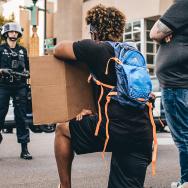When physicist Brian Nord joined the Dark Energy Survey in 2012, a state-of-the-art project to map the night sky, he was—as far as he knew—the only Black American man in the multi-institution collaboration of more than 400 scientists. Today, he still is.
“When I was a child, I wanted to grow up to share the beauty and gifts of a scientific understanding of the universe with the world,” Nord wrote in an open letter to global colleagues. “I’ve had the privilege to find and create knowledge for my fellow humans. I’m one of the ‘lucky’ ones. How many have shared my dream, but never got this close, because of the science community’s complicity through inaction?”
An associate scientist at Fermilab and University of Chicago visiting research assistant professor, Nord is a member of Particles for Justice—an international movement of scientists that works to counter social injustice in science. He and astrophysicist Chanda Prescod-Weinstein of the University of New Hampshire co-led a call for a day of action June 10 in which non-Black scientists would plan how to better support their Black colleagues and address the racial injustices in society, academia and in science.
Thousands of scientists around the world participated. Large scientific collaborations like LIGO, the Rubin Observatory Legacy Survey of Space and Time and the Dark Energy Survey cancelled their meetings; the journals Science and Nature, as well as the popular site arxiv.org, paused their publishing. Instead, scientists—including many in the physical sciences at UChicago—read, reflected, donated and met on how to move forward.
“Our Black colleagues do not feel safe in our work environment. That’s not OK,” said astrophysicist and graduate student Adina Feinstein, who is white. “For academia as an institution—a space that prides itself on boundless creativity and innovation—to be systemically racist is so backwards. But we are using the momentum of the current atmosphere to strongly push for these changes.”
Feinstein and Thaddeus Komacek, a postdoctoral researcher in the Geophysical Sciences, lead a discussion in the Exoplanet Journal Club and came up with a list of immediate initiatives for the group. They, along with other scientists in the Inclusivity, Diversity, and Equity in Astronomy group, also pulled together a list of larger, concrete action items that the astronomy community could undertake to improve equity.
Chihway Chang, the Clare Booth Luce Assistant Professor of Astrophysics, also discussed action plans within the Survey Science group she led together with Asst. Prof. Alex Drlica-Wagner. Chang, who grew up in Taiwan, said the past few weeks of protest and discussion in the U.S. have been transformational for her.
“In the beginning, I think I didn’t really understand the full extent of the problem since I didn’t grow up here and have less of the cultural background,” she said. “But inequality in academia—that is something I understand. As a woman in science, I think back on all the incidents in my academic career where I thought, ‘Should I say something?’ and I stayed quiet because it felt like it wasn’t going to change anything.
“This feels different,” she said. “This feels like change is possible. And now that I’m faculty, I especially have the responsibility to make changes,” she said. “You need to do that to show students it’s OK to speak up.”
Nord agreed.
“Sometimes people hear and respond empathetically, but it’s usually behind closed doors,” he said. “My colleagues are still realizing the need to publicly hold each other accountable when racist, misogynistic or homophobic things are said. You can still uphold the values of free speech and also hold people accountable for racist statements.”
Sam McDermott, a Kavli Institute for Cosmological Physics associate fellow, also helped organize the day of action. He spoke on the need for white scientists like himself to educate each other and hold each other accountable.
“No one likes to hear that they’re part of a racist establishment,” he said. “It’s often met with defensiveness or evasiveness. I’ve had some good, sincere conversations with people in power in the past few weeks; but it’ll be a really long time before we know how much they really meant it.”
There’s really one metric for success, McDermott added: “Do our institutions reflect the makeup of the country as a whole at every level—directorships, department chairs, collaboration heads, postdocs and students?”
As for a plan, Nord said: “Go find where Black people do physics. Hire them and retain them. Pay them competitively and for skills they have, like how to manage white supremacy—Black people have been doing a lot of work for the academy that we don’t get paid or recognized for. That’s how you rebuild your institution in a way that is just and equitable.”

